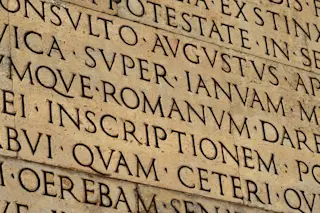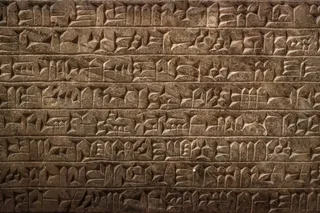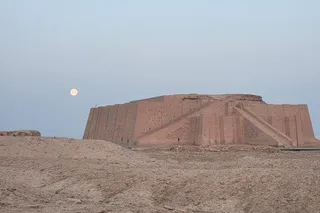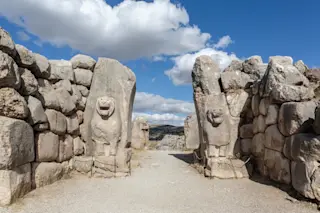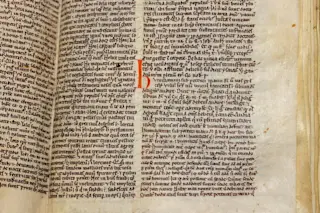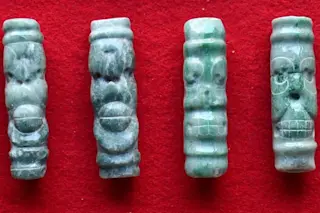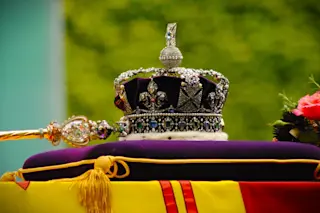We don’t know how language first began. The first writing didn’t occur until around 3200 B.C.E., and we know that spoken language came before that. Some experts contend that it started with hand gestures along with sounds and signals that, in short order, gave humans a leg up when it came to survival.
Fast forward a few thousand years, and the ancients were steeped in it. The Ancient Greeks, for example, were known for their linguistic achievement. By this time, an abundance of languages would have existed and been spoken throughout Greece and around the world.
But if there wasn't a language in common, ancient people would have turned to an interpreter. Translation in ancient societies wasn’t as formal as it is today, and interpreters who could speak Greek, Latin, Persian, Coptic, and Arabic, to name a few, would have had to mediate across cultures at trade routes or on diplomatic missions, says Martina Cola, a linguistic researcher at Think in Italian.
“They played a very important role because formal written translation was rare, and translation was almost always oral and carried out in real-time,” says Cola.
Translating Languages in Ancient Times
When tradesmen went on journeys along the Silk Road, for example, they would have traveled with a team, and part of that team would have included someone who knew the language in the place where they were headed.
“One of the key challenges that ancient translators faced was the lack of standardization in languages,” says Cola. Grammar and formal dictionaries didn’t exist, so navigating translation was built on intuition and experience.
The need to translate foreign language depended on the time period. For example, the Classical Period from 510 B.C. to 323 B.C. is one where Greeks weren't learning many other languages, says Eleanor Dickey, a linguist and professor of the Classics at the University of Reading.
“During this period, the Greeks are very proud that they speak Greek and they look down on anyone who doesn’t,” says Dickey. “They didn’t see the purpose in communicating with people who didn’t speak their language.”
Read More: New Evidence for How Languages Spread 10000 Years Ago
Mastering New Languages in Ancient Greece
Once the Romans conquered the Greeks around 146 B.C., they needed to start learning Latin.
“The Romans are clear that the high register of government (and the court system) is going to take place in Latin,” says Dickey.
When learning a language was necessary, Greeks and other ancient cultures would learn orally in a less formalized way than we would today. But they also translated the language using papyri, which had Greek on one side and the language that they were trying to learn, often Latin, on the other side.
These papyri texts would have been similar to what you would find in a foreign language textbook today. They contained conversation pieces important for the time, like things you would say at the ancient baths, how to order fish from the fishmonger, or how to go to court, or sue someone.
Read More: An Ancient Form of Greek Language Needs Help to Survive
Why Ancient Societies Became Bilingual
Not everyone would have been learning other languages in most ancient societies. In Egypt, for example, once it was conquered by the Romans, not everyone would have learned Latin. It was usually men who learned language within this society because it was necessary if you joined the Roman Army or if you were studying Roman law, and these were two jobs entirely occupied by men.
“Both the Roman army and Roman law were officially carried out in Latin,” says Dickey.
The Romans, on the other hand, learned Greek more widely because it was thought to be something that the elites should know so they could read the Greek tragedies. As a cultural language, it would have been studied by the wealthy, and in some cases, it could have included women.
Today, navigating language is still a difficult and important task. In the U.S., while English is the most widely spoken language, there are 350 other languages that are also spoken within our borders. But at least today, we have Google translate to help us out in a pinch.
Read More: Eight Ancient Languages Still Spoken Today
Article Sources
Our writers at Discovermagazine.com use peer-reviewed studies and high-quality sources for our articles, and our editors review for scientific accuracy and editorial standards. Review the sources used below for this article:
Britannica. Ancient Greek civilization
Linguistic researcher at Think in Italian. Martina Cola
Linguist and professor of the Classics at the University of Reading. Eleanor Dickey
Medieval manuscripts blog. Two in one: a newly-identified bilingual papyrus
USA.gov. Languages spoken in the U.S.



